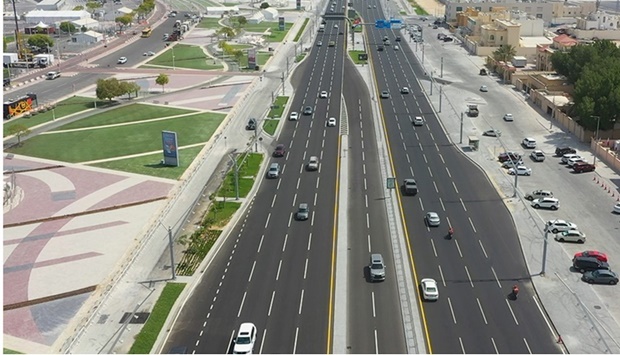With the completion of the upgrade works, Al Waab Street will be a vital link for road users coming from Doha Expressway, Sabah Al Ahmad Corridor, Al Furousiya and Al Sailiya Street, providing an alternative route for the paralleling Salwa Road, the authority said in a statement.


Ashghal enhanced the previous road from three lanes to four in each direction, linking Sabah Al Ahmad Corridor with Al Furousiya Street, while developing parts of the surrounding local roads.
Four junctions have also been developed, namely Mehairja Intersection, Khalifa Olympic City Intersection, Sports Hall Intersection and Baaya Intersection.
As a result, the road capacity has increased from 12,000 vehicles per hour to 16,000 vehicles per hour.
 M. Youssef Al-Emadi |
In addition, the project provides 3km of cycling paths and 15km of pedestrian paths, extending across most parts of the road.
Additionally, about 102,000sq m of green areas has been planted.
In addition, infrastructure services have been developed as part of the project, such as 15,000m of rainwater drainage network, 2,600m of potable water network pipes and 12km of electricity networks.


These are in addition to 440 lighting poles, 81,000 tonnes of asphalt, 185,000cu m of excavation materials being extracted and 295,000sq m of paving materials being used.
Al Waab Street is located in a densely populated area with vital commercial activities, as it has many malls, shops, recreational facilities, government institutions and sports facilities such as Aspire Zone and Khalifa International Stadium, which will host a number of FIFA World Cup Qatar 2022 matches.
 Bader Darwish |
He said that Ashghal is keen on implementing various infrastructure projects in conjunction with the government's plans.
Highway Projects Department manager Bader Darwish said that due to its vital location, which links many densely populated areas, streets and vital facilities, Ashghal has developed Al Waab Street to raise its efficiency.
The development projects will achieve traffic flow, reduce traffic congestion on the surrounding streets and reduce the journey time between Al Rayyan, Muaither, Al Aziziya, Baaya, Luaib, Mehairja and Al Sadd.
 Saad al-Dosari |
In addition, the works involved improving service roads and expanding intersections to achieve great traffic flow, which will shorten the journey time.


He added: "Around 75% of the materials used to develop Al Waab Street are locally manufactured. The project took about 2,128,591 working man-hours."
Ashghal has developed and implemented many vital roads in recent years, particularly Salwa Road, Al Rayyan Road, Sabah Al Ahmad Corridor, Al Waab Street, Al Furousiya Street, Al Khufous Street and others.
Consequently, these projects have improved traffic flow in West Doha and provided more options for road users.

